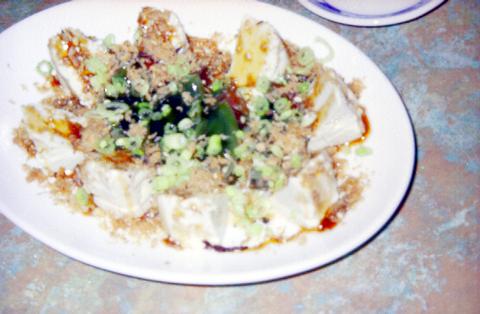Dai's House of Stinky Tofu has another name in Chinese -- House of Unique Stink. It may sound funny to foreigners who are loathe to try the unique dish, but after visiting Dai's, one may find that stinky tofu really doesn't taste as bad as it smells.
Almost every dish at Dai's is made using stinky tofu. There are the typical tofus; steamed, stir-fried, and grilled, but Dai's is the only place in the world, according to owner Wu Hsu Pi-ying (
Decades ago, stinky tofu was a military staple for soldiers patrolling China's borders. But as Taiwan's night-market culture developed, so did stronger, spicier and more diverse flavors of stinky tofu.

PHOTO: YU SEN-LUN
Unlike most night-market stinky tofu stands where the odor permeates the air, Dai's house is simply a clean, ordinary restaurant with a huge Crouching Tiger poster on the wall.
Film director Lee Ang (
The somewhat freaky cold stinky tofu (涼拌臭豆腐) is actually quite refreshing -- similar to, but milder than blue cheese. With its soft and dense texture, it's served with shredded scallions in a light soy sauce and is recommended as a starter.
The raw tofu adds a new line to Dai's 50-year-old menu and is, according to Wu, the healthiest way to try stinky tofu.
In some places, you really don't want to know how the tofu is made, said Wu. Long ago, some used rotting seafood to ferment the bean curd while others used chemicals. But Dai's products are all vegetarian, using amaranth, mustard leaf, bamboo shoots and more than 10 kinds of Chinese herbs to ferment the bean curd for six months, said Wu.
Pure vegetarianism has turned Dai's stinky tofu into something of an urban legend. Seven years ago, Tsinghua University's (
Fried stinky tofu is the least pungent and therefore more suitable for first-timers. The fried tofu of the house (招牌炸) is Dai's flagship dish and has extra-crispy skin and smooth tofu inside. Try mixing the four sauces into your own blend: soy sauce, garlic and radish pastes and chili sauce.
For solo visitors, the tofu fried noodles with spicy and sour sauce (

Dissident artist Ai Weiwei’s (艾未未) famous return to the People’s Republic of China (PRC) has been overshadowed by the astonishing news of the latest arrests of senior military figures for “corruption,” but it is an interesting piece of news in its own right, though more for what Ai does not understand than for what he does. Ai simply lacks the reflective understanding that the loneliness and isolation he imagines are “European” are simply the joys of life as an expat. That goes both ways: “I love Taiwan!” say many still wet-behind-the-ears expats here, not realizing what they love is being an

Every now and then, even hardcore hikers like to sleep in, leave the heavy gear at home and just enjoy a relaxed half-day stroll in the mountains: no cold, no steep uphills, no pressure to walk a certain distance in a day. In the winter, the mild climate and lower elevations of the forests in Taiwan’s far south offer a number of easy escapes like this. A prime example is the river above Mudan Reservoir (牡丹水庫): with shallow water, gentle current, abundant wildlife and a complete lack of tourists, this walk is accessible to nearly everyone but still feels quite remote.

Google unveiled an artificial intelligence tool Wednesday that its scientists said would help unravel the mysteries of the human genome — and could one day lead to new treatments for diseases. The deep learning model AlphaGenome was hailed by outside researchers as a “breakthrough” that would let scientists study and even simulate the roots of difficult-to-treat genetic diseases. While the first complete map of the human genome in 2003 “gave us the book of life, reading it remained a challenge,” Pushmeet Kohli, vice president of research at Google DeepMind, told journalists. “We have the text,” he said, which is a sequence of

It’s a bold filmmaking choice to have a countdown clock on the screen for most of your movie. In the best-case scenario for a movie like Mercy, in which a Los Angeles detective has to prove his innocence to an artificial intelligence judge within said time limit, it heightens the tension. Who hasn’t gotten sweaty palms in, say, a Mission: Impossible movie when the bomb is ticking down and Tom Cruise still hasn’t cleared the building? Why not just extend it for the duration? Perhaps in a better movie it might have worked. Sadly in Mercy, it’s an ever-present reminder of just